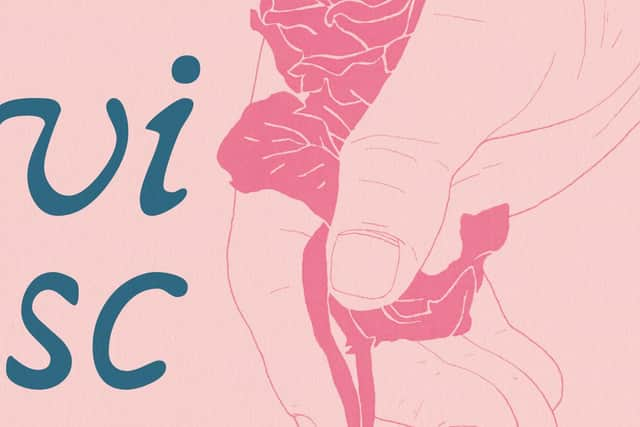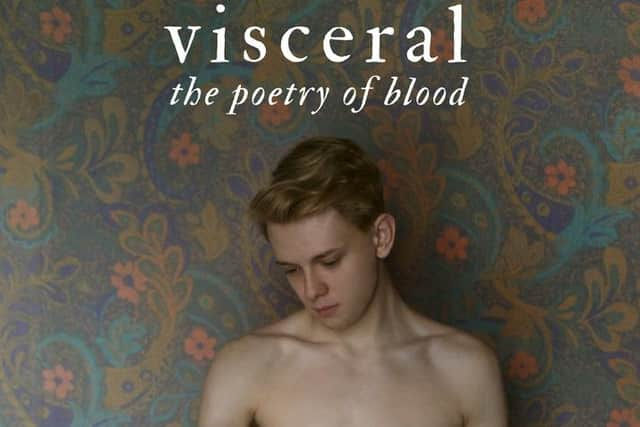RJ Arkhipov’s acclaimed poetry collection ‘Visceral’ reissued to celebrate end of UK’s gay blood donor ban
According to its own figures, the Scottish National Blood Transfusion Service has just a four-day supply of O negative blood at any one time – well short of what it says it needs to safely manage the requirements of NHS Scotland.
In the most critical emergencies, when doctors must perform a transfusion, but do not know a patient’s blood group, O negative is the only kind that does not pose a life-threatening risk of rejection.
Advertisement
Hide AdAs it happens, I have O negative blood, and the specially-issued gold donor card to prove it.
When I sit down with RJ Arkhipov in a bustling bistro in Edinburgh, I briefly take it out of my wallet for him to examine.
The topic is a fascination for self-described New Scot. Born and raised in Wales, the 29-year-old only settled in Edinburgh two years ago after the publication of Visceral – the collection of essays and poetry that he penned in his own blood.
Long-listed for the Polari First Book Prize in 2019, Visceral’s publishers have reissued the collection in a new paperback edition containing illustrations by French artist Fabien Ghernati.
Arkhipov tells me its dramatic origins lie in his time studying at the University of London Institute in Paris, when he stumbled upon the city’s bohemian set.


“I was surrounded by artists of every flavour, really fascinating and eccentric people – anarcho-communists, drag queens – everyone and everything you could imagine,” he recalls.
Advertisement
Hide AdInvited to perform in at festival at 59 Rivoli, a celebrated squat for writers and artists, Arkhipov was understandably daunted.
“You can see the art on the front of the building – it spills out the windows and out onto the street,” he says.
"Artists there have a space to do whatever they like.”


Advertisement
Hide AdHe grins. “I was quite a mild-mannered Welsh boy who just happened to find himself in Paris writing poetry.”
Searching for inspiration, Arkhipov was struck by a line attributed to Ernest Hemingway.
“Any English-speaking person who lives in Paris will sooner or later come across Hemingway and his writing because he spent so much time there,” he explains.
“There’s a line that's often attributed to him – ‘there is nothing to writing. All you do is sit down at a typewriter and bleed’. That was the first line that made me think this is a really interesting subject to explore.”


‘Inkwell’, the very first of Arkhipov’s blood poems, was completed minutes before he stepped on stage to perform it at 59 Rivoli.
Buoyed by its reception, and convinced there were greater depths to plumb in the subject, he threw himself into creating an entire collection of blood poems.
Advertisement
Hide AdArkhipov’s poetry is a delicious mix of the erotic and the macabre that examines the symbolic significance of blood in six chapters: Abjection, Ancestry, Faith, Intimacy, Mortality and Stigma.
The collection is regularly sprinkled with examples of concrete poetry, where typography conveys as much meaning as the words themselves.
Advertisement
Hide AdIn a poem called O, Arkhipov carves out his lines in concentric circles – a nod to Dante’s Divine Comedy that also neatly encapsulates its sanguine subtitle: ‘A Circulatory Story’.
But the 29-year-old has a playful side too.


The stanzas of one poem entitled ‘Baptism’ treat in-the-know readers to a delightfully naughty in-joke born out of his time in the French capital, exploring the cobbles and cornerstones of the infamous Rue du Temple.
Both the poem’s title, and the Parisian street it stands in ode to, conjure an element of what Arkhipov calls the “queering” of faith – a concept intended to inspect more traditional religious concerns of purity and probity.
Its final chapter, Stigma, rails against the rejection of “gay blood”, and explores, with uncomfortable force, how moments of intimacy are still haunted by fears around HIV/AIDS.
As Arkhipov writes in the afterword to Visceral’s new edition: “So much blood has been spilled in achieving the rights I enjoy today, the non-violent spilling of my own blood to protest, in poetry no less, the bans on gay blood donation seems a fitting tribute to my LGBTQ forebears.”
Arkhipov’s frustration is one I share. The gold blood donor card I showed him has sat unused in my wallet for years.
Advertisement
Hide AdUntil now, gay men across Britain have been forbidden from donating blood without first abstaining from sex for at least three months.
The fact that I have been in a monogamous relationship for almost a decade was considered irrelevant.
Advertisement
Hide AdDespite its origins as a protest, however, Visceral’s paperback edition now has much to celebrate.
Its release on Monday coincided with World Blood Donor Day and with the changes to rules in England, Wales and Scotland that allow gay men in long-term relationships to donate blood without restrictions.
For Arkhipov, who married his partner between the publication of Visceral’s first and second edition, the end of ban represents something of a culmination for his life and his work to date.
“You know, I came out in Paris, both as a gay man and as a poet,” he says. “It was where I first learned how to express myself in those ways. It was where things started.
“So for me, for my poetry, it has all tied together.”
Later, after I have bid farewell to the poet, I fish through my wallet and pull out the gold donor card. I am not sure why I have kept it in there for so long. On the front it reads: “My blood is perfect for emergencies.”
I think to myself: “Well, it is now.”
Visceral: The Poetry of Blood goes on sale in bookshops from today.
Advertisement
Hide AdSigned copies of the new paperback edition as well as limited edition bookplates can be purchased here.
A message from the Editor:
Thank you for reading this article. We're more reliant on your support than ever as the shift in consumer habits brought about by coronavirus impacts our advertisers.
If you haven't already, please consider supporting our trusted, fact-checked journalism by taking out a digital subscription.
Comments
Want to join the conversation? Please or to comment on this article.